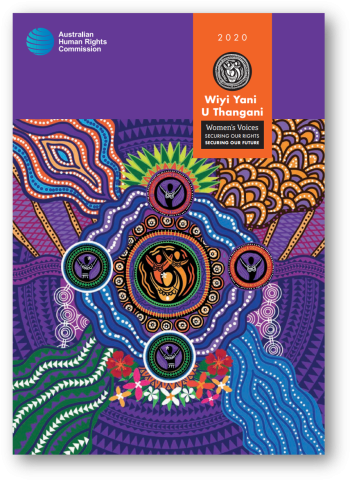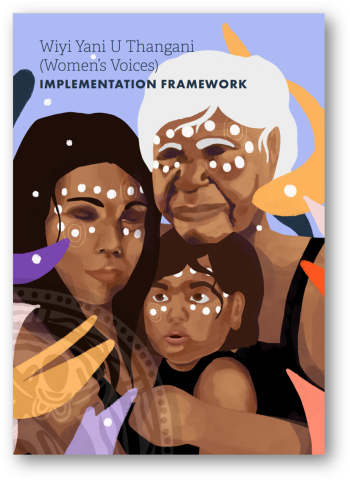Throughout 2018, the Commissioner and her team travelled to 50 locations in urban, regional and remote areas across every state and territory. They conducted 106 engagements and met with 2,294 women of all ages, including senior elders, girls from 12 to 17 years of age, women in prison and Lesbian, Gay, Bisexual, Transgender, Queer or Questioning, Intersex, Asexual, Sistergirl and Brotherboy (LGBTQIA+SB). Over 100 submissions and 300 survey responses were also received.
Each engagement was approached with no set agenda. The central aim was to look beyond the cycles of crisis that have come to characterise First Nations lives, and to make space for women and girls to determine the conversation and define their lives in their own terms.
Wiyi Yani U Thangani provides the evidence that the inequalities experienced by First Nations women and girls are perpetuated and entrenched by mainstream systems and structures that have marginalised the voices of women and girls for generations. First Nations women and girls are clear: we need large-scale structural change to create a world where the unique cultural, social, economic and political rights and interests of First Nations women and girls are realised. We need First Nations gender justice and equality.
The Report
Read the Report Read the Community Guide
The Report is broken into five parts, each containing a number of chapters. Part One explores the major themes that emerged from the stories of women and girls taken together and sets out the ‘Way forward’—a comprehensive plan for structural reform. Part 2-5 are informed by the stories of women and girls across all aspects of life from education to child protection, health, community safety, land and country, employment and housing.
Watch the following video series of Commissioner Oscar describing each part of the Report.

Implementation Framework
The Implementation Framework, published in January 2022, draws on the findings of the Wiyi Yani U Thangani Report, and begins the work in translating the findings into actions using a systems-thinking approach.
The Implementation Framework introduces a First Nations gender-responsive systems practice approach. This is in response to the Report’s major finding that systemic change is required, as a process and as an outcome, to meet the needs and rights of First Nations women and girls.
The Implementation Framework identifies three overarching structural transitions that are relevant across all systems. These are:
- a shift from top-down and detached to relational, collaborative and self-determined decision-making
- a shift from uncaring and punitive to caring and enabling systems
- a shift from short-term, insecure and uncoordinated to long-term, secure and holistic funding
The Implementation Framework also lays out four thematic areas (see below) with major priorities, as well as actions identified under each. This structure provides a focus on the key interconnected drivers of structural equality identified by women and girls, and how to support and invest in these drivers into the future.
- Thematic area 1: Leadership and decision-making for self‑determination
- Thematic area 2: Language, land, water and cultural rights
- Thematic area 3: Societal healing and intergenerational wellbeing
- Thematic area 4: Economic justice & empowerment
The Implementation Framework presents a strong foundation for the National Framework for Action to be built from, laying the groundwork for a First Nations women’s agenda to unite multiple stakeholders to achieve gender equality.

Women's Voices
Women are the social fabric of communities and the glue that holds everything together.
My true strength is my identity, where I’m from and whatever I use from my culture to keep me strong.
We [Australia] don’t own our history—Other colonised countries who have experienced genocide have had Truth Telling Commissions ... we want the truth told so you can understand ... We have a lot of healing to do as well ... if you’re faced with day to day struggle, you can’t heal— it needs to be collective healing.
What keeps me strong is my grandmothers—they didn’t have the power to have a voice and I am bloody determined to make sure my girls have a voice.
What makes me strong is six generations of strong women that taught us about country.
We put women and families at the centre and we talked about all those things you’ve already shared because if the women disappear from that centre— once you remove her, that mother, grandmother, the family structure starts to crumble.
Our identity is everything. Culture is everything. Our relationships with others, who are our elders, are everything, totems, Island dancing, traditional sacred dancing. Respect everyone where they live. Our law— no trespassing and obeying Laws. Family gathering and feasting together, sharing one another, helping each other in different times. When someone passes away, we help them grieve and get them together. Land and sea provides us with food, shelter and clothing.
Systems all exist within the Western framework. [We] fight for justice for our people within this system ... We have great political advocates for social justice, but our issues are continuously framed within the Western framework.
here is strength when we [women] get together, because we all feed off each other. We know that this is the times when ideas happen. When we go ‘yes! This is the solutions. This is how we can enact it.’ We want to see, you know, it promotes strength. It promotes healing, it promotes self-determination, it builds our self-esteem. It’s about solution driven, it’s empowering, it’s about cultural education and celebrating who we are.


